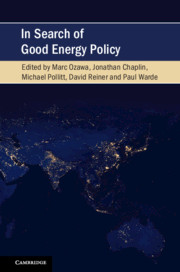Book contents
- In Search of Good Energy Policy
- In Search of Good Energy Policy
- Copyright page
- Contents
- Figures
- Tables
- Contributors
- Acknowledgments
- 1 Introduction
- Part I Multidisciplinary Perspectives
- 2 Political Science and Energy
- 3 Economics – The Proper Valuation of Security and Environment
- 4 Good Energy: Philosophical Perspectives
- 5 Public Theology – ‘Grounded’: An Energy Policy Rooted in Human Flourishing
- 6 Anthropology and Energy Policy
- 7 History: A Long View?
- 8 Management – From the Drawing Board to Successful Delivery
- 9 Legal Aspects of Energy Policy
- Part II Cases and Multidisciplinary Responses
- Part III Multidisciplinary Cases
- Index
- References
5 - Public Theology – ‘Grounded’: An Energy Policy Rooted in Human Flourishing
from Part I - Multidisciplinary Perspectives
Published online by Cambridge University Press: 10 June 2019
- In Search of Good Energy Policy
- In Search of Good Energy Policy
- Copyright page
- Contents
- Figures
- Tables
- Contributors
- Acknowledgments
- 1 Introduction
- Part I Multidisciplinary Perspectives
- 2 Political Science and Energy
- 3 Economics – The Proper Valuation of Security and Environment
- 4 Good Energy: Philosophical Perspectives
- 5 Public Theology – ‘Grounded’: An Energy Policy Rooted in Human Flourishing
- 6 Anthropology and Energy Policy
- 7 History: A Long View?
- 8 Management – From the Drawing Board to Successful Delivery
- 9 Legal Aspects of Energy Policy
- Part II Cases and Multidisciplinary Responses
- Part III Multidisciplinary Cases
- Index
- References
Summary
This chapter sets out the contribution to ‘good energy policy’ that might be forthcoming from the (perhaps unfamiliar) field of ‘public theology’. It argues that an environmental public theology would commend a ‘grounded’ energy policy – one rooted in an explicit conception of a ‘good’ or ‘virtuous’ human life. After defining ‘public theology’, it identifies five convergent stances relevant to energy policy that seem to be emerging today among representative of most world religions: (i) nature as a ‘divine’ ordering marked by integration, equilibrium and harmony rather than as infinitely exploitable; (ii) a call for human ‘stewardship’ of nature; (iii) an acceptance of climate science and an urgent call to shift away from fossil fuels; (iv) scepticism towards unlimited economic growth and its attendant ‘consumerism’; (v) locating energy questions within a broader commitment to a just social order characterised by both an equitable global distribution of access to energy and a decentralisation of energy supply (‘environmental subsidiarity’).
Keywords
- Type
- Chapter
- Information
- In Search of Good Energy Policy , pp. 57 - 68Publisher: Cambridge University PressPrint publication year: 2019

